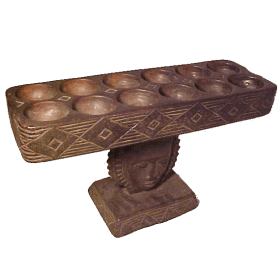Kalaha
 Hra Kalaha je jednou z rodiny tahových strategických deskových her pro dva hráče, které se hrají s malými kamínky, fazolemi nebo semeny a řadami děr nebo důlků v zemi, v desce nebo v jiném hracím povrchu.
Hra Kalaha je jednou z rodiny tahových strategických deskových her pro dva hráče, které se hrají s malými kamínky, fazolemi nebo semeny a řadami děr nebo důlků v zemi, v desce nebo v jiném hracím povrchu.
Cílem je obvykle získat více kamenů než získal soupeř.
Počet hráčů: 2
Trvání hry: 5 mn
Složitost: 1 / 5
Hraj Kalaha a 1229 dalších her online.
Žádné stahování, hraj přímo ve webovém prohlížeči.
S tvými přáteli a tisíci hráči z celého světa.
Zdarma.

Hraj Kalaha a 1229 dalších her online.
Žádné stahování, hraj přímo ve webovém prohlížeči.
S tvými přáteli a tisíci hráči z celého světa.
Zdarma.

Přehled pravidel
The Game of Kalah
Kalah, also sometimes referred to as Kalahan or Mancala, is a game where players compete to capture more stones (or seeds) than the opponent. Kalah is an adaptation of the ancient game Mancala, from where it gained it's name.
Equipment and Set Up
Kalah is played on a board with two rows consisting of six round holes and a large store at either end called Kalah.
A player controls the six holes closest to them and the Kalah on their right side.
The board is set up with the same number of stones in each round hole. The Kalah is empty at the start of the game.
Beginners may want to start with three stones in each hole, but the game becomes more and more challenging by starting with 4, 5 or up to 6 stones in each hole. Traditionally the game play is most associated with 4 stones.
Gameplay
On your turn, choose a hole on your side of the board that has stones in it. Moving counter-clockwise (to the right) around the board, drop 1 stone into each hole until you run out of stones. You always drop a stone in to your own Kalah in passing but never into the opponent's.
Once a player captures a stone in their Kalah, it remains there for the rest of the game. You never pick up stones in the Kalah.
~ If your turn ends with the final stone dropped into your Kalah, take another turn.
~ If your turn ends with the last stone dropped into an EMPTY hole on YOUR SIDE of the board, capture all the stones in the hole opposite it, (on the opponent's side). Place their stones and your capturing stone into your Kalah. Your turn is now over.
~ If your turn ends with the final stone dropped into an occupied hole on your side of the board, your turn ends.
~ If your turn ends with the final stone on the opponent's side of the board, nothing happens. Your turn is over.
When a player has no stones on their side of the board and it is their turn to play, the game is over. All the stones remaining on the other player's side of the board go into their Kalah.
This BGA game will end when more than 50% of all stones are in a single player's Kalah (19 stones in a game starting with 3 stones per hole, 25 when starting with 4 stones per hole, 30 when starting with 5 stones, and 37 when starting with 6).
During Your Turn
Play is always counterclockwise. On a turn, the player chooses any of the occupied holes on their side of the board and removes all stones.
Moving counter-clockwise, the player drops one stone in each hole, including the player's Kalah, until all stones are placed. Players may not skip a hole or their own Kalah, but do not place a stone in the opponent's Kalah.
The player's turn is over when they drop their last stone into an opponent's hole or one of their own occupied holes.
If the last stone is dropped into the player's Kalah, they must move again.
If the last stone is dropped into an empty hole owned by the player, they capture all stones of the opposite hole together with the capturing stone and put them in their Kalah.
If the opposite hole is empty, nothing is captured, and the players turn is over.
Ending the Game
There are two ways to end the game in Kalah:
1. When a player, at their turn, is unable to move, because they no longer have any stones in any of their holes. The remaining stones are captured by their opponent. The game is over and the player with the most stones in their Kalah is declared the winner.
-OR-
2. When during gameplay, a player captures more than half of the stones on the board into their Kalah. This player wins and the game is over.
Variants
Pie rule
Once the first player's turn is over, the second player may choose to take their turn as normal or claim the opponent's move and position by changing sides of the board.
Empty Capture
This variant permits a player to capture their final stone dropped during a move, when it's dropped into one their own empty holes, even when the opposite hole of the opponent is empty.
Number of Starting Stones
This variant allows a game to start with 3, 4, 5 or 6 stones in each of the 12 holes.
Other Variations
There are several other variations of this game which are not available on BGA such as:
- No capture
- Placing stones in both Kalahs
- Self capture by placing stones in an opponent's empty hole
- No counters in the holes to indicate the number on stones in them.

